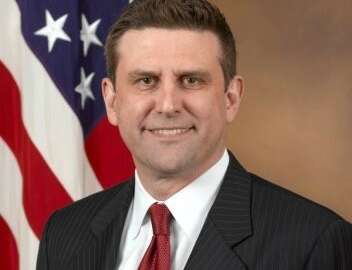National Intelligence University moving under ODNI umbrella
A change in parent organizations is coming to the National Intelligence University. With what this means NIU president, J. Scott Cameron spoke to Federal Drive with...
Best listening experience is on Chrome, Firefox or Safari. Subscribe to Federal Drive’s daily audio interviews on Apple Podcasts or PodcastOne.
A change in parent organizations is coming to the National Intelligence University. It’s about to move from under the Defense Intelligence Agency and become a part of the Office of the Director of National Intelligence. With what this means, plus a bit of history, the NIU president, J. Scott Cameron spoke to Federal Drive with Tom Temin.
Interview transcript:
Tom Temin: Dr. Cameron, good to have you on.
Dr. J. Scott Cameron: Thanks, Tom, great to be with you.
Tom Temin: Let’s begin with the organizational change. It seems more like a change of ownership than any reorganization of NIU itself. What’s exactly going on here?
Dr. J. Scott Cameron: Great question. This is a really big watershed moment for the institution. The institution’s got an almost 60 year history, most of it under the Department of Defense as a military intelligence college. And over the past 10 years was reinstated as a university serving the broader intelligence enterprise. So our executive agency under DIA, began back in 2010. And for the last 10 years that stewardship has been in partnership with the director of national intelligence. And in 2017, Congress commissioned the study to kind of look to see what the future of the institution looked like with ODNI – and it was advised that having that more direct relationship with our stakeholders, and we’re deeply integrated into the intelligence enterprise was what would give us the strength of our mission for the future. And that’s exactly where we are today.
Tom Temin: Yes, because in the ODNI then all of the intelligence components then become, maybe, have equal input into what the needs, they have are that could be expressed by NIU offerings.
Dr. J. Scott Cameron: Exactly. However, you look at the intelligence enterprise, the intelligence cycle, you see statutory authorities, you see functional disciplines, you see intellectual capital residing in all of these different components. And what we do is we bring all of them together, it’s like a jigsaw puzzle. And then our students experience that integrated view and study in depth to look at that. And our research programs are driven by that intellectual capital that we bank from all of those different agencies and departments.
Tom Temin: And tell us more about NIU. It’s not simply a training center for people in the IC, it’s a full degree granting institution with .edu. Tell us more about it and the types of degrees it offers.
Dr. J. Scott Cameron: So as a federal university, like the other federal universities under DoD, our programs are approved by the US Department of Education. The Hill then authorizes me to confer degrees as a federal institution to our students. And then the Middle States Commission on Higher Education, which is the accrediting body for most of the regional institutions here, then make sure that we are delivering education at the standard at which we need to be accredited. And so all of those things kind of come together for us in a way that allows our students to be at a university in a closed community so all communities bank knowledge to survive and be successful. And for those parts of us as a classified institution, we’re able to bank that intellectual capital and work at that level, at the top secret level, with our students reflecting the requirements and needs of our stakeholders. And that’s actually the big part of this change, is being able to be in a close partnership with our stakeholders that way, be accountable to them, and then actually then be accountable to us to send those students for the programs that they believe those knowledge, skills and abilities reflect the future workforce.
Tom Temin: And so you can give master’s degrees and what sort of offerings are there? Give us a few specifics.
Dr. J. Scott Cameron: So we have an undergraduate degree, Bachelor of Science in Intelligence – which essentially is if you have 90 credits, if you’ve gotten most of the way through your degree in a year, we will finish that degree with you. You’ll do it as a cohort of individuals with a capstone experience, which is, in my estimation, very close to a graduate experience. That degree does a lot to change people’s lives in terms of giving them that degree that they’ve long sought – and then it changes their posture in the workforce. It’s just been there’s great stories that come out of watching our students kind of get that, maybe they’re the first person in their family to achieve a degree in higher education. We have two master’s degree, a Master of Science in Strategic Intelligence, and we have a Master of Science in Technology Intelligence. And we offer a couple of certificate programs in which the topics through that, whether they be regional topics, functional topics, people can come in and pick those up. So we are one step on the journey of lifelong learning in the IC. So training and education cycles, we’re one step – but we’re that step often when we have people in their 30s coming in at that point in their career, when we can really make a difference and give them that infusion of education, awaken those leadership skills and get them ready to go back and make the changes for the future that they’re gonna lead.
Tom Temin: We’re speaking with J. Scott Cameron and he is president of National Intelligence University. And who can attend because I imagine, I’m just making this up, but suppose I’m a third year poly sigh student somewhere, and I’m watching TV the other day and there’s old Vlad Putin there extolling and yakking away at the press there and It occurs to me, this is really interesting stuff, and this small country punches way above its weight – I’d like to get into the field of understanding what’s going on internationally, and maybe helping my country in some way. Can someone like that find a way into NIU to, as you say, finish with an intelligence degree?
Dr. J. Scott Cameron: So I’ll talk to you right now as a third year policy student at one of our regional universities and within the consortium of universities here in the Washington Metro area. So we’ve met, we’re talking, and you just expressed that interest, and I’m going to say, wow great to hear that, I love to see that inspiration of what you want to do and make a difference for your country. So there are different ways to get in the intelligence community, we kind of walk through all those opportunities, kind of maybe you refine where your interests, your talents, and abilities might lie. And then we become a perk after you’ve been hired into the government. So you can look forward to a tuition free educational experience with us after you’ve been employed, cleared top secret SCI as a federal employee, and that’s who our students are.
Tom Temin: Do you also accept people that are federal employees with clearance not from the IC? For example, maybe from the State Department.
Dr. J. Scott Cameron: Absolutely. That’s actually one of the strengths of the institution is that we have the intelligence community, the broader intelligence enterprise. If you think about after 9/11, I was at USDA early on in my career. So I mean, there skiffs there. HHS, the non Title 50 elements that actually have incredibly important roles in defending infrastructure and health and welfare of the US. So yeah, the the breadth of people who are driven by intelligence, but may not be collectors and analyzers of intelligence are still impacted by the policies, the international relations of the country. So we get their perspectives mixed into the classroom. 100% of our students will tell you, that is exactly one of the big strengths of their education.
Tom Temin: And at a given time, how many students are enrolled in do they live there, because not everyone lives in the D.C. area that might want to attend?
Dr. J. Scott Cameron: Yeah, we’re a small institution, we’re not a resident institution. Although people for many years, our students in uniform will PCS here, so people will come. We are destination location on people’s educational journeys, but we are the resident institution. But at the same time, our full time program, I think, in the hundreds – and then our part time program, so if we have two to 300, full time students will be twice as many part time students. And 75% of our students do come part time on their own time, nights and weekends.
Tom Temin: And tell us about your own background briefly. You said you started at USDA, I’m trying to imagine what happens in a skiff at USDA, maybe a new form of cattle that eats carbon dioxide instead of produces it, wouldn’t that be revolutionary. But tell us how you came to this position.
Dr. J. Scott Cameron: So my journey was as an academic in the 80s and 90s. Actually, my background is in plant physiological genetics. I was actually a bit of an Indiana Jones plant explorer for a while, looking at photosynthesis, basically trying to feed the Third World. The second half of my career is trying to protect the entire world, and that high consequence science and high consequence national security. So that’s been kind of my theme. I came to DC in 2000, right before 9/11. And then after 9/11 was recruited over when there was an influx of science going into the IC after 9/11, after Iraq, WMD. Basically, the idea was, let’s broaden the DNA of our science component. I came in for a sabbatical from USDA working for the secretary of agriculture as his national security adviser and briefer, started at CIA and moved over to the National Counterterrorism Center and spent 13 years kind of looking at counter WMD issues there.
Tom Temin: Wow. And what kind of reaction do you get at college president types of meetings and forums?
Dr. J. Scott Cameron: It’s great. The local consortium here – we’re a small institution, we’re a bit unique. But all of my colleagues here – and a shout out to the consortium of Washington Metro agency universities here and the other presidents – we meet on a regular basis. And I learned so much from those, it’s really humbling to be with Georgetown, American, GW – all of them sitting in one room talking about the challenges that we do have in common. We all care deeply about education and the future of education.
Tom Temin: But then you’re lucky on one hand, you don’t have to deal with something like the Harvard General Studies faculty.
Dr. J. Scott Cameron: Okay. So the beauty of what we do as an institution is we are very, very focused on national security in a way that gives our students breath to go back to the mission, and they study the way they perform in their mission day to day.
Tom Temin: J. Scott Cameron is president of National Intelligence University. Thanks so much for joining me.
Dr. J. Scott Cameron: Tom, thanks so much for your time. Really appreciate it.
Copyright © 2025 Federal News Network. All rights reserved. This website is not intended for users located within the European Economic Area.
Tom Temin is host of the Federal Drive and has been providing insight on federal technology and management issues for more than 30 years.
Follow @tteminWFED






